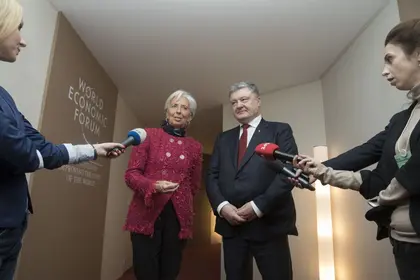Ukraine has Hr 306 billion ($10.9 billion) in debts to pay off this year, the Finance Ministry announced in a document released last week.
The total sum of $10.9 billion – which includes $4 billion in payments to foreign creditors like the International Monetary Fund, World Bank, and private Eurobond holders – will be taken out of some $18.8 billion in foreign currency reserves held by the National Bank.
- Obtain the most current Ukraine news articles released today.
JOIN US ON TELEGRAM
Follow our coverage of the war on the @Kyivpost_official.
That $18.8 billion was itself accumulated in part thanks to loans from the IMF, which has supplied the country with $8.5 billion in loans since 2014.
The upcoming debt payments highlight a perpetual dilemma in Ukrainian politics: At what point does the country’s financial situation become so dire that political leaders are forced to exchange domestic legislative changes for low-interest loans from the IMF and the World Bank?
The Finance Ministry’s report identifies around two thirds of the country’s debt payments as stemming from internal payoffs, adding up to around $6.9 billion in payments.
Of that, much of the debt appears to emanate from treasury bills issued to fill a $5.6 billion hole in PrivatBank, which the Ukrainian government nationalized in December 2016, taking on the obligation to pay for money allegedly stolen by its former owners, Gennadiy Bogolyubov and Ihor Kolomoisky.
The report notes $2.8 billion in payments from 2016 treasury bills come due this year, as well as an additional $751 million issued in 2017 coming due this year.
But is it enough?
Many analysts are looking to see if President Petro Poroshenko’s administration can last until the March 2019 presidential elections without relying on IMF funding.
The Washington D.C.-based international lender is demanding that Ukraine create an independent anti-corruption court and raise gas prices to European market levels before it receives the next $1.9 billion tranche along the $17.5 billion bailout scheme.
“It’s no problem for them to survive,” said Oleksandr Savchenko, a former NBU deputy governor who chairs Kyiv’s Institute for International Business. “They only have to pay off $4 billion.”
Savchenko believes that the Poroshenko administration has gotten away with fooling the IMF into giving it enough cash to survive until reelection without implementing lasting, structural reforms. The pattern Savchenko described replicates the behavior of previous Ukrainian governments.
“There are $18.8 billion in the NBU’s reserves. Before the elections, around $7.7 billion will have to be returned,” he said. “And if they’re smart, they can issue internal bonds at five percent, without any corruption involved, and could easily gather one billion that way.”
“I don’t expect any new reforms this year,” he added.
In the debt report, the Finance Ministry wrote that it expects to raise $3.7 billion in foreign debt this year, depending on market conditions.
Dragon Capital Chief Economist Olena Bilan took a different view, arguing in a research note that $4.5 billion debt payments due in 2019 would force the government to go to the IMF for funding.
“High external debt repayments this and next year (est. $4.5 billion from the budget) will keep Ukraine in need of IMF support,” Bilan wrote, suggesting that Ukraine would have difficulties receiving private funding on international capital markets without IMF support. “While the IMF no longer provides budget financing to Ukraine, a working program with the Fund would facilitate budget support from other IFIs and external credit markets.”
You can also highlight the text and press Ctrl + Enter




